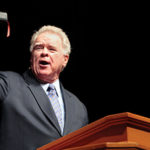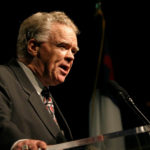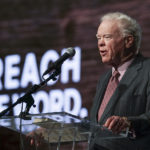Posted 7/02/03
Seek Long Range Control of SBC Boards
By Toby Druin,
Associate Editor
(Originally published April 23, 1980)
The organization that last year pushed the inerrancy question at the Southern Baptist Convention is active again, this time seeking lay participation from every association and state convention. Their goal is to determine who is elected SBC president for at least four consecutive years and maybe as many as 10, and through presidential committee appointments try to control nomination of trustees of SBC agencies.
Lay involvement is being sought because "many pastors lack the courage to deal with the problem," it was charged, and because it is the lay church members who control the money going to denominational agencies and who through their contributions ultimately determine the paths those agencies follow.
Paige Patterson, president of Criswell Center for Biblical Studies in Dallas, revealed the plan and made the charges in a meeting April 3 seeking lay volunteers to organize the effort. He reiterated them in an interview with the Baptist Standard on April 14.
A year ago Patterson and Houston appeals court judge Paul Pressler were the key figures in a plan to elect an SBC president committed to biblical inerrancy and to ending an alleged drift toward "liberalism." They organized meetings in most state conventions and then supported Adrian P. Rogers for president. The Memphis pastor was elected on the first ballot.
This year, it was revealed at the meeting April 3 at the Spurgeon-Harris Building which houses the Criswell Center in Dallas, that Pressler has organizations in all state conventions. He is attempting to enlist laymen in every association.
Dallas attorney Edward J. Drake, a former chairman of deacons at First Church, Dallas, presided over the April 3 meeting, explaining that Pressler had requested he serve as North Texas organizer, responsible for seven Texas counties. Drake has been named by Rogers to the SBC committee on Resolutions.
Two other Dallas men, attorney August Boto and accountant J. Keet Lewis, were presented at the meeting as being responsible for organizing laymen in Dallas Association. Fourteen attended, including three pastors, although at least 560 "concerned laymen" had been invited.
Sign up for our weekly edition and get all our headlines in your inbox on Thursdays
The object is to enlist laymen from each Southern Baptist church, encouraging them to become more involved in their associations, state conventions and the SBC, especially attending the upcoming meeting of the SBC in St. Louis. The organization is offering assistance in getting rooms at Ramada Inn South or at Concordia Seminary, Patterson said.
Drake said the object was to enlist laymen to help stem, as he charged, the drift away from the Bible which had resulted in the evangelistic ineffectiveness.
Patterson, principal speaker at the meeting, said last week "the issue still is truth — is the Bible in fact totally and completely true? Are we really in substance reduplicating the faith of our founding fathers — are we true to the Anabaptist vision? Do we believe today what Hubmaier, Marpeck, Helwys, Smith, Richard Furman, Judge R.E.B. Baylor, B.H. Carroll, J.B. Tidwell … believed?"
"I am of the persuasion that most Baptists do" still hold such beliefs, he said in his office at the Criswell Center. "But I am also of the persuasion that a very large contingency in significant denominational posts do not in fact believe that any longer."
In the interview he declined to identify those "in significant denominational posts" or any of the seminary or college professors he charges are not teaching according to his historic Baptist beliefs.
"Our objective has never been to get anybody fired," he said. But he acknowledged that has happened in the past when similar charges have been made.
Their "preference" is twofold, he said — first to see genuine revival sweep all SBC agencies so the historical beliefs that have characterized Southern Baptists could "manifest" themselves and second that those who hold views contrary to those beliefs voluntarily go elsewhere.
For now, he said, the matter is in the hands of the trustees of the SBC institutions and agencies.
He quoted B. H. Carroll, president of Southwestern Seminary, who before his death in 1914, Patterson said, told his successor, L. R. Scarborough, that Southwestern was the "last bastion of orthodoxy left."
"He told Scarborough he was to keep Southwestern in its orthodox position and he said, "If liberalism develops on the faculty take it to the faculty. If the faculty won’t hear you, then take it to the trustees. If the trustees won’t hear you, take it to the convention that appointed them. And if the convention that appointed them won’t hear you, then take it to the people — the people will always hear you."
Even though "a number of months have gone by" since his organization first leveled its charges, Patterson said, "We do not feel we have given sufficient time yet to various boards of trustees involved to go beyond that and take it to the convention itself or again beyond that to the people themselves."
But the effort to determine election of the SBC president is aimed at ensuring future boards of trustees agree with the Patterson position. The SBC president appoints not only the committee on resolutions but also the committee on committees which names the committee on boards, which nominates trustees. The trustees then are elected by the convention.
Patterson told the April 3 meeting that they could depend on Adrian Rogers naming a committee on committees sympathetic to their views. Explaining that statement in the April 14 interview, he said he was referring to Rogers’ reply to a reporter shortly after his election that he would not knowingly appoint anybody to any committee who was not completely solid in his confidence in the scriptures, the infallibility of the Bible.
He said he had not seen Rogers’ nominations and has tried to avoid discussing convention matters with him, because he didn’t want to place an "albatross around his neck in me and whatever I was doing."
Rogers, contacted in Memphis last week, said he knew nothing of the current political moves, dissociated himself with them, and said he was "amazed and mildly disappointed" at the news.
He said he was almost through with his committee nominations, and that he would always try to name persons to committees who believed in the integrity of the scriptures. "That is where I have been all my life, Paige Patterson notwithstanding. And I don’t think anybody would want me to be otherwise," he added.
He said he was unaware of Drake’s involvement with the organization effort, that his only knowledge of him was that he was a member of First Church, Dallas, was a former chairman of deacons there and "loved the Lord."
Patterson also told the April 3 meeting that SBC Executive Committee Executive Director Harold C. Bennett could "be depended on." He explained he had met with Bennett to explain what they were doing, seeking whatever advice or warning Bennett might have.
"By ‘he could be depended on,’ I meant he could be depended on theologically," Patterson said later. "Dr. Bennett has reaffirmed not only to me personally but also on television and elsewhere his total confidence in the scriptures. He is a man of absolute and undying integrity. I have never seen anything in him that would give any reason to suspect anything other than total integrity."
It would be erroneous to imply Bennett had encouraged him or his efforts, he said. "He was very neutral, as a good executive probably should have been."
Bennett confirmed last week he had met on March 6 with Patterson in Bennett’s office in Nashville. It was his understanding that Patterson had meant his group intended to elect an SBC president for five consecutive two-year terms, he said, but he said he tried to be neutral in the matter, giving neither encouragement nor warning.
"I have tried to listen to whoever calls and wants to talk to me," he said.
Patterson said he would favor no change in the 1963 statement of Baptist Faith and Message and knew of no movement among his friends or followers to accomplish it.
"I wouldn’t change the 1963 statement myself," he said, "I am perfectly happy with it because, as you know, it says the Bible contains truth without mixture of error."
"Whether you say inerrant or truth without mixture of error for its matter is inconsequential. In fact, our whole deal is not the necessity for changing the statement of faith. Our whole concern is to not continue to make a mockery of it. Let’s admit what it means, which, of course, was done by both Herschel Hobbs and Wayne Dehoney at the Houston convention. They said what was meant by the writers."
Hobbs, chairman of the committee that drafted the statement, and Dehoney, pastor of Walnut Street Church in Louisville, both stated in Houston they felt the writers of the statement held to the inerrancy of the original autographs — the actual writings of the prophets and apostles — when they drafted the "truth without any mixture of error for its matter" portion of the statement on scripture.
Patterson said his definition of inerrancy would be that there was no mistake in the original autographs of the scriptures. There are grammatical mistakes and "transcribal inadvertencies or whatever you want to call them" in Bibles today, he said, but "we can now arrive at a 98 per cent accurate text." The remaining two per cent in question are "scribal problems that can be worked out gradually," he said.
The current controversy is not new, he insisted, citing others in the past, and saying the present move was brought on "as much as anything else by the unwillingness of certain groups to really deal with the Broadman Commentary issue."
The commentary issue erupted at the SBC meeting in Denver in 1970 over interpretation of Genesis. Volume I subsequently was revised in 1973.
Patterson said emphatically he felt what he is doing is not divisive and should not be branded as "politics."
Liberal tendencies have emasculated other previously orthodox denominations, he said, when they ignored warnings. "I think the real question is do you help anybody by pretending that serious disease is not present" he said.
"What we are doing is not politics," he said, responding to the mention of the convention action last year decrying overt political activity.
"And I just wonder how some other people feel about it who are on the other side. It is no secret Jimmy Allen publicly politicked for the office of president. He called a meeting in St. Louis (before his election in 1977) and one of our St. Louis brethren was at a microphone in Houston asking for permission to speak to remind the president of the fact and that he was at the meeting. But he was not recognized.
"That is one of the great injustices. We were labeled with politicking and calling meetings. Nobody else calls meetings? It’s just not true."
Allen, contacted in Richmond where he was involved in a "Follow Christ Crusade," said he had spoken to a regular pastors’ conference at the invitation of St. Louis pastor Cleveland Horne who said in introducing Allen that he would be nominated to succeed James L. Sullivan who had recently indicated he would not serve a second term. "There was a lot of discussion about the SBC there that day," Allen said, "but no political strategizing."
The big difference, Patterson said, was that his group did not have a candidate." We do not have a candidate; we shall not have candidates. Our whole thing has been issue-oriented, not candidate oriented."
Drake said, however, to the laymen April 3 that Judge Pressler would remain in contact before the convention with his association and state organizers and during the sessions in St. Louis, determining the issues and keeping them informed about them.
But, Patterson, insisting "eternal vigilance" is the price of a "God-honoring denomination," said such maneuvers are not "politics." "I don’t see any difference in that and in what B.H. Carroll instructed Lee Scarborough to do when he said he should be sure the people who what’s going on.
"We are not running a candidate. We are concerned Baptists, and if that is politics then what state paper editors do when they write is also politics. Any time an editor editorializes he is in politics. He is giving his viewpoint and he has an entree to the people that even pastors don’t have."
Of those pastors, he said at the April 3 meeting, "Let’s face it, most lack the courage to deal with the problem."
In the interview later he said he probably should have said "many pastors" instead of "most pastors," however. "When you are talking to a group you don’t always say exactly what you want to say," he explained.
But he said that his investigations over the last few months had led him to believe that in the eyes of many pastors the convention has become "big brother."
"And I would not hesitate to say that many pastors fall into one of two categories. Either they have not investigated for themselves and out of a false sort of loyalty refused to investigate, do not want to know or don’t want to be bothered with it.
"Or they know it and understand it and have admitted to us they see it and understand and yet do not have the courage to stand up for it."
He doesn’t find such problems among laymen, he said.
"We have found that when a layman has it put in front of him and he looks at it, he says, ‘Oh, my goodness.’ He is not trying to go to a new pastorate. He is going to be right where he is from now on," Patterson said.
The laymen also control the money, he noted, "And apparently that is the only thing some folks understand," implying laymen who support SBC programs, especially those who are big givers, can get things done when others cannot.
Patterson expressed his love for the convention and said he intends to stay with it.
"I love our Southern Baptist people and think we are — as far as I can tell — the best opportunity this old world has for hearing the gospel before Jesus comes.
"My commitment is to stay and to love it and work for it and I will do that whether or not I am accepted by leadership or rejected by leadership. It won’t make any difference.
"I have done what I have done without antagonism and with love for everybody. And if God will help me I intend to keep it that way."














We seek to connect God’s story and God’s people around the world. To learn more about God’s story, click here.
Send comments and feedback to Eric Black, our editor. For comments to be published, please specify “letter to the editor.” Maximum length for publication is 300 words.